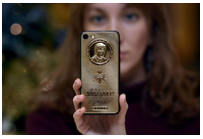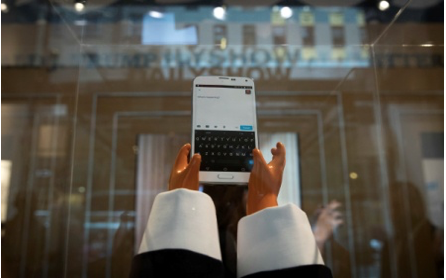CommentsGUEST WORDS--As a lawyer, there's little I've wanted less than to be part of a lawsuit. Contrary to movie and television portrayals, going to court is rarely the best way to fix a problem. There's no Judge Judy to dispense quips and quick resolution. Cases are more likely to drain money and energy without concluding in a way that satisfies anyone. But sometimes going to court is the only way to resolve things. Like when the president of the United States is violating your constitutional rights.
Today, the Knight First Amendment Institute, which represents me and others who have been blocked by President Donald Trump's account on Twitter, filed a lawsuit in the Southern District Court of New York asking the president to unblock us.
Trump seems to have blocked me, @rpbp, on Twitter after I commented on Russia's involvement in the 2016 election. The Tweet was liked and retweeted by thousands of people. Soon after, I realized I could no longer see @realDonaldTrump's Tweets—his self-proclaimed official statements.
When I look at my Twitter feed now, Tweets quoting Trump's statements appear as a comment over a gray box: "This Tweet is unavailable." When I go to his account, I get a field of gray and a "Learn more" button. When I click, I learn that "Blocking helps people in restricting specific accounts from contacting them, seeing their Tweets, and following them."
Getting blocked has kept me from participating in public conversations in response to and about the president. I can't see or reply to Trump's account, or see which of his tweets others are quoting and commenting on from my own account. In sum, I'm prevented from talking to those who are responding to his tweets, learning their views, and sharing my own views.
As a writer, having the president block my Twitter account makes my work harder. I used my account to monitor general reactions in the threads that sprout from the president's Tweets. But I also used it to track the responses of other writers, editors, and experts on lists I've built over time. Since being blocked, I've found it difficult to stay current and produce timely analyses.
Being able to use my Twitter handle of nearly a decade to participate in conversations is also crucial. Other writers, opinion leaders, and commentators know me as @rpbp. The blue check beside my name signals that Twitter has verified my identity and determined mine is "an account of public interest." Among other privileges, that blue check gives people I don't know a reason to respond when I engage them. I shouldn't have to use a new account, unknown to others and unverified, to see, respond to, and engage in conversations based on the president's Tweets.
 An employee of Caviar Phones, a Russian-Italian company specializing in smartphone customization, displays a special gold-plated iPhone 7 smartphone bearing the likeness of President Donald Trump.
An employee of Caviar Phones, a Russian-Italian company specializing in smartphone customization, displays a special gold-plated iPhone 7 smartphone bearing the likeness of President Donald Trump.
There's also a personal dimension for me.
As a second-generation American, I am proud of our country and the principles the U.S. stands for. My grandfather came to the U.S. from Spain as an exile fleeing a fascist regime. When my grandmother arrived in this country from Colombia, she told me that she marveled at the freedom of American women.
The Constitution is anything but abstract to me. It's the beacon that brought my grandparents here. Ensuring that its guarantees extend to everyone is my professional calling; it's why I went to law school and why I do what I do each day. I work to advance civil rights in our country through law in part because those rights made my grandparents' lives here and mine, possible.
By blocking people from his Twitter account, our lawsuit argues, the president violated the First Amendment. The president's Twitter account, @realDonaldTrump, is a "designated public forum," subject to the First Amendment. The Constitution prohibits the government from excluding people from a designated public forum because of their views.
Clicking "block" probably only took a few seconds. Being blocked, however, is something that will affect me for a long time. I've traveled and lived in countries where voicing dissent can have negative repercussions. Not once had I ever thought I might have to fear losing rights for expressing my political views in the U.S. Feeling silenced and marginalized at home has shaken me.
Suing the president of the U.S. to ask that he stop violating my First Amendment rights and unblock me could be a reason to feel even more fear. There's the possibility that we who are part of the suit will face scrutiny, hostility, and even aggression. But right now I feel only hope. The right to seek a legal remedy when the president violates my rights is an extraordinary thing, one of many things that makes America great.
(Rebecca Pilar Buckwalter-Poza, a Pacific Standard contributing writer and a graduate of Harvard College and the Yale Law School, has written on law, politics, and policy for NPR, CNN, The Atlantic, the Daily Beast, and Politico, and appeared on MSNBC. She co-authored 40 More Years with James Carville and contributed to Paul Begala's Third Term. This piece was provide to CityWatch by Pacific Standard Magazine.)
















